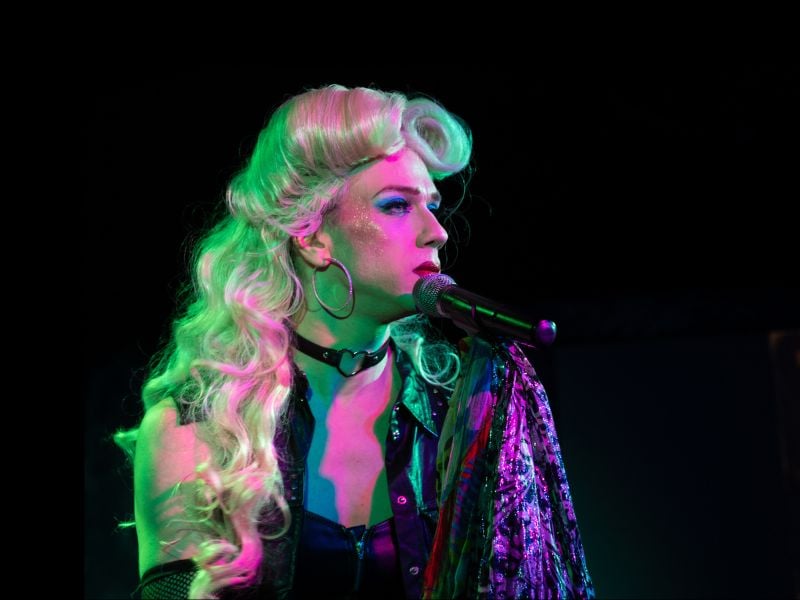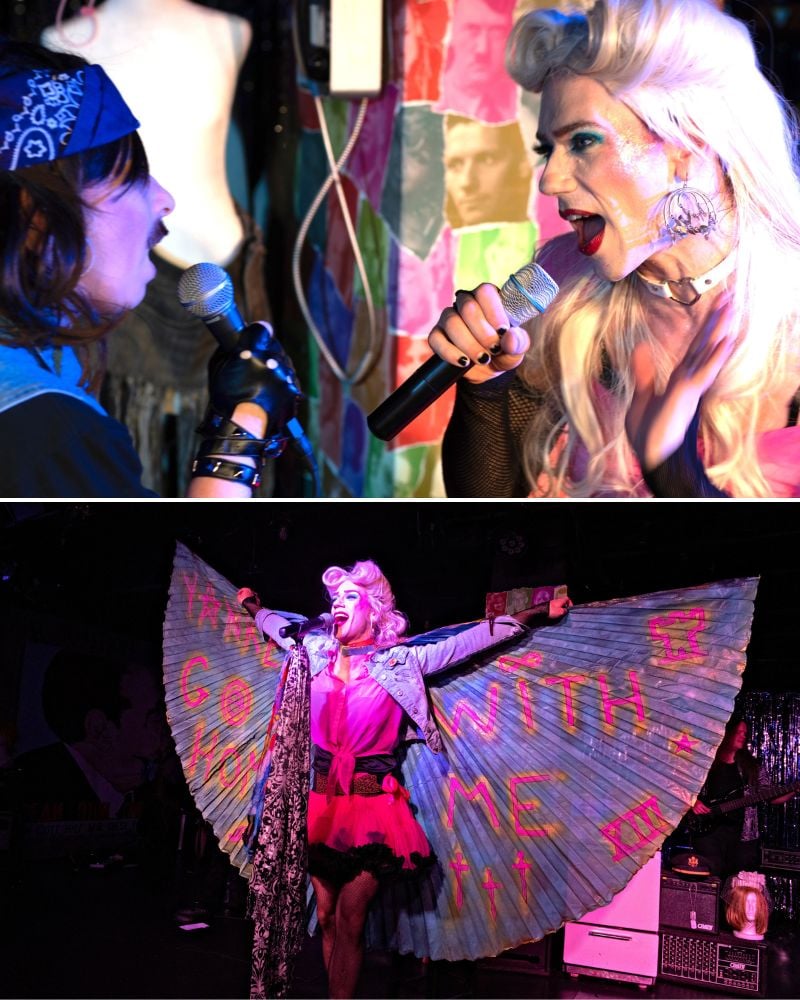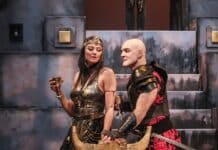Hedwig Robinson is washed up, sipping vermouth straight from the bottle with a long pink straw, while her ex, who stole all her songs, plays a sold-out concert across the street. She’s at the center of a scandal and she is delighting in it, cracking jokes, flirting with the audience, even as years of pent-up hurt and rage sometimes bubble over into yelling at her bandmates or storming off stage. But just as quickly, she composes herself, checks her makeup, adjusts her wig, and continues telling the story of how a botched sex change operation led to this “anatomically incorrect musical odyssey.”
Inside the Maryland Ensemble Theatre (MET), the audience sits in a packed room, with Hedwig and her punk rock band almost at touching distance, which is exactly how Hedwig and the Angry Inch is meant to be experienced.

The show was written and first performed by John Cameron Mitchel in 1998 with music and lyrics by Stephen Trask, and then became a queer cult classic film in 2001. This is how director Anna See-Jachowski and musical director Eric Jones first discovered this iconic genderqueer character. And like many queer and trans people before and after them, they were impacted by the joy and trauma held in Hedwig. It took See-Jachowski and Jones seven years to bring Hedwig and the Angry Inch to the Frederick stage (the COVID pandemic being one of the major hurdles). Faithful to the show’s origins, they’ve managed to create an experience that combines the energy of an unhinged drag show with the edginess of an underground punk rock club.
Hedwig narrates her journey from being a young gay man in East Berlin pre-fall of the Berlin Wall to becoming a sex worker in Kansas and meeting Tommy Gnosis, whom she thought was her soulmate. Except he betrays her, steals all the music they wrote together, and becomes an international rock star, leaving Hedwig in obscurity until a recent scandal brings her back to relevance. This is Hedwig’s hilarious and heartbreaking attempt to reclaim her narrative and her music.
“Hedwig and the Angry Inch is a rock musical that tells the story about identity, about the human experience, about our raw, unfiltered need for love. It’s a story about what can become of us when the parts of us that develop to help us survive can harm others,” stated See-Jachowski, who is also a licensed therapist. “Our take on Hedwig’s story is one in which she is able to take stock of all of the different versions of a person she has had to be.”
MET’s Hedwig is brought to life by Off-Broadway actor and drag performer Lynwood McLeod, whose range is on full display. McLeod flows from effortless charisma and humor to moments of genuine vulnerability and distress, masked as anger. They also assume a number of voices and accents as they narrate the different chapters of Hedwig’s life. As a vocalist, McLeod appears at ease whether belting out punk rock anthems like “Tear Me Down” and “Angry Inch,” taking a melodious turn in power ballad “The Origin of Love,” or bringing in the audience for a sing-along in “Wig in a Box.”

But no Hedwig is complete without her reluctant husband, Yitzhak, played with side-eyeing disdain by Melanie Kurstin. Yitzhak’s story is a prime example of what many trauma therapists describe as “hurt people hurt people.” Yitzhak was a Jewish drag queen who married Hedwig as a way to escape his oppressive country, mirroring how Hedwig married an American soldier to escape her own oppression. And much like Hedwig was forced to give up a piece of herself – her gender as a man – she forces Yitzhak to give up ever performing as a woman again, for which he deeply resents her. Kurtin showcases her vocal talents as backup vocals in most of the songs, then as lead vocals on the melancholic “The Long Grift,” and at her full diva-level at the end of “Midnight Radio.”
The Angry Inch band completes the rest of the stage cast, with Jones and Andy Wright on guitars, Ray Shaw on bass, Shayden Jamison on drums, and David Weinraub on keyboard. As musicians, they bring the punk rock energy and tempo that the songs demand, while sound designer Ryan Edwards manages to keep decibel levels at a range most elder millennials would approve of (audience members are also provided with “ear tampons” if they want them). As actors, they bring the realism of being part of a band whose lead singer is hanging on by a thread but they have a show to put on.
The production value is amplified by an immersive set design by Jones and Stephanie Davis that includes murals featuring the Berlin Wall’s iconic graffiti the Fraternal Kiss and spray-painted messages like “No More Walls No More Wars,” which are still painfully resonant today. The lighting design by Will Heyser-Paone brings a colorful, frantic energy to the show and is used to great effect. As part of the sound design, the Tommy Gnosis concert next door creeps its way into the venue each time the main doors are opened and the sounds of fans cheering and Tommy being a narcissist are clearly audible. Additionally, a screen projection on the side of the stage complements Hedwig’s narration, with pre-recorded scenes directed by Robin C. Farrell, animations designed by Elizabeth Miranda (including an homage to the film), and original Tarot card designs by Justin Johnson that mirror the story and punctuate story beats.
Hedwig and the Angry Inch may have graced major stages, including its Broadway revival featuring NPH a few years ago. But the show’s origins and spirit live in underground drag punk venues like the one MET was able to create, where queer performers put themselves out there in a show that takes an outrageous and at times absurd character and turns Hedwig’s story into one about catharsis and completion.
Running Time: 90 minutes with no intermission.
Hedwig and the Angry Inch plays through August 23, 2025, at Maryland Ensemble Theatre‘s Robin Drummond Main Stage, 31 W Patrick Street, Frederick, MD. Tickets are $25 and can be purchased by phone at 301-694-4744, online, or in person at the MET box office, open Tuesday to Thursday, 12 – 6 p.m., Fridays 12 – 4 p.m. and one hour before performances. Donations are accepted to benefit the Frederick Center and MET.
Performances will take place on Thursday, Friday, and Saturday at 8 p.m. with a bonus 5 p.m. performance on Saturday, August 23. The Friday, August 22 performance will feature ASL interpretation services.
A MET-X production
Hedwig and the Angry Inch
Text by John Cameron Mitchell
Music and Lyrics by Stephen Trask
The production team is led by Anna See-Jachowski (Director) with MET Ensemble Members Eric Jones (Music Director), Olivia Pietanza (Assistant Director/Stage Manager), Sam White (Assistant Stage Manager), Cody James (Technical Director), and Matt Harris (Production Manager). The design team also includes MET Ensemble Members Rachel Grant Smith (Costume Supervisor), Eric Jones (Co-Set Designer) and Sam White (Graphic Designer). Rounding out the design team are Will Heyser-Paone (Lighting Designer), Ryan Edwards (Sound Designer), Stephanie Davis (Co-Set Designer), Nancy Jones (Scenic Painter/Assistant Costume Supervisor), Jesye Havrila (Hair/Wig/Make-Up Supervisor), Tekla Taylor (Tarot Artist), and Elizabeth Miranda (Animation Designer).
The cast features MET Ensemble Members Eric Jones, Shayden Jamison, and Will Marian. They are joined by Lynwood McLeod, Melanie Kurstin, David Weinraub, Andy Wright, and Ray Shaw.
COVID Safety: Facemasks are strongly encouraged but not required. MET’s Safety policy can be found here.



